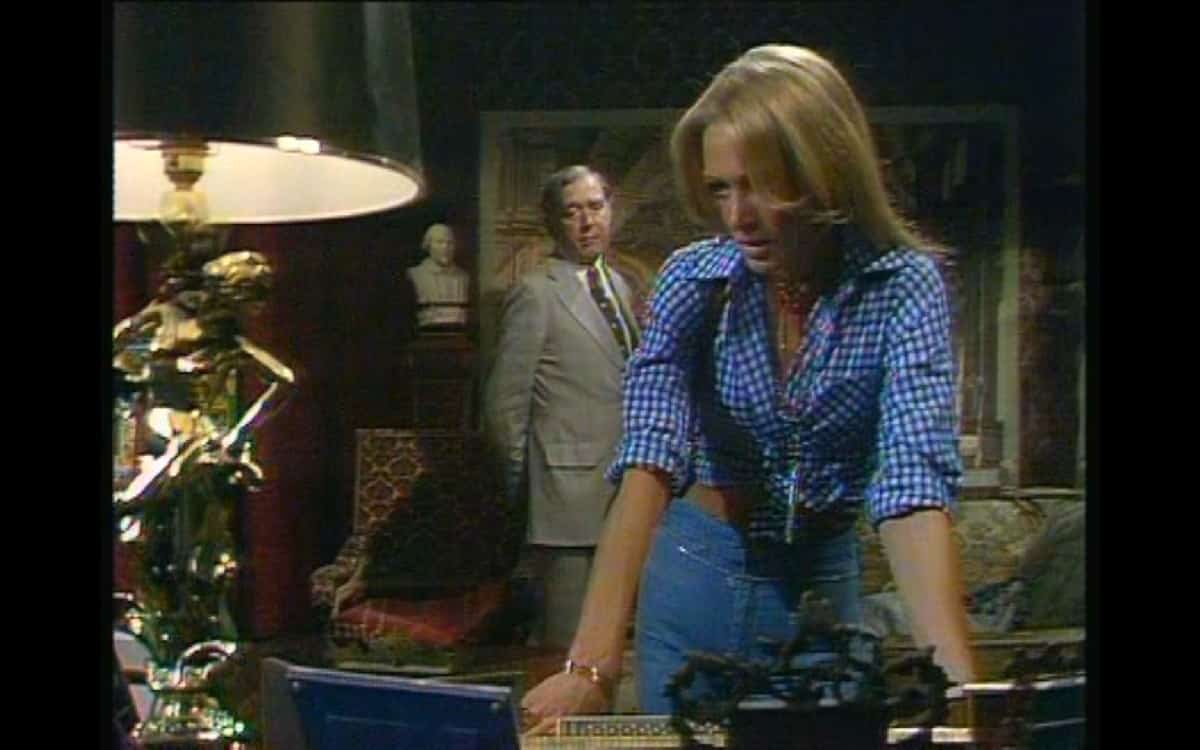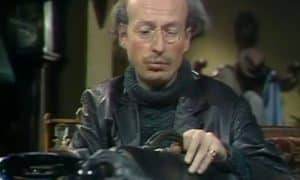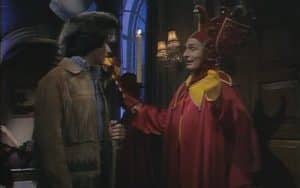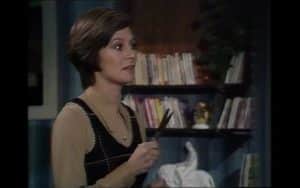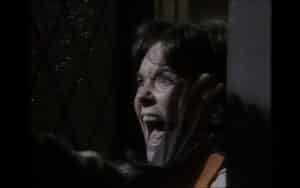A Shakespeare loving teenager’s vicious murder is unsolved after five years, until a novice investigator arrives in town. RICHARD PHILLIPS-JONES looks at Thriller: A Midsummer Nightmare.

TITLE: Thriller – A Midsummer Nightmare
BROADCAST: 15 May 1976
STARRING: Joanna Pettet, Brian Blessed, Freddie Jones, Norman Rodway, Anthony Pedley, Elsie Randolph, Tony Anholt, John Ruddock, Alison Glennie
WRITER: Brian Clemens
DIRECTOR: Don Leaver
Annabella Tully (Glennie) is walking into her local woods to meet with a secret lover, having wrapped a copy of Shakespeare’s A Midsummer Night’s Dream in a protective plastic bag. Meanwhile, an unknown person (the lover?) is scraping away all sign of a message carved on a tree: “Annabella loves…” – we do not see the second name.
Spotting Annabella approaching, the figure with the knife moves away, and she buries the book at the base of the tree. Her back turned, the figure approaches her, raising the knife. Annabella turns and screams…
It’s a pre-credits sequence which feels like a nod to earlier days of Thriller, but post-credits we jump forward five years to a bustling city street, where Jody Baxter (Pettet) is walking along, en route to visit estranged husband Johnny (Anholt), a private investigator who clearly wants them to get back together. There’s a hint that Jody’s displeasure with the marriage stems from Johnny’s unwillingness to let her get involved in his business, but he can’t hang around for chit chat as he has a case in Italy to deal with, and he’s already running late for the plane.
A crestfallen Jody is leaving the building, when she spots Arnold Tully (the ever-dependable Freddie Jones) heading towards Johnny’s now-locked office. He is looking for “J. Baxter, Confidential Enquiries”, and seeing an opportunity to get involved with Johnny’s work and prove her worth she says “Yes, that’s me! Jody Baxter…”
Despite his old-fashioned reservations about hiring a female, Arnold agrees to charge Jody with the task of investigating the still unsolved murder of Annabella, who it transpires was his niece. Arnold is convinced that the killer is local amateur dramatics enthusiast Peter Ingram (Rodway), a view shared by many of the locals, including Detective Sergeant George Briggs (Blessed), who allows Jody access to the case files.
Jody asks why Ingram was never tried for the crime: Briggs explains that the police never felt there was sufficient evidence to be confident of a conviction and that, if Ingram was acquitted, they would not be able to proceed with another prosecution if new, stronger evidence came to light (the legal principle of Double Jeopardy – see footnote).
Despite her lack of experience and pretence to be something she isn’t (indeed, she’s arguably as much of a charlatan as Gary Collins was in Dial A Deadly Number), Jody can’t help but wonder if the perceived wisdom on the case is correct, and her own investigations increasingly point the finger elsewhere. Meanwhile, her charade may be about to be exposed…
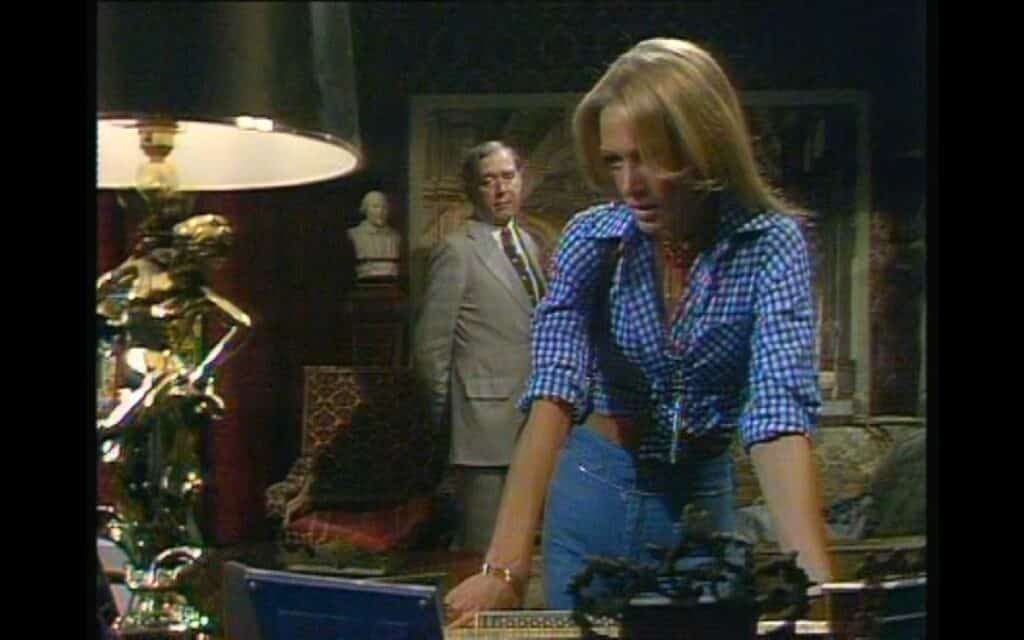
Another interesting experimental spin on the format, with the investigation of a cold case – it might seem that you can’t watch a crime show nowadays without encountering one, but it would have been much more of a novelty then and the result is a generally melancholy piece, its morose tone almost signalling the end of an era as Thriller approached the buffers: For all that the trees in the woods might be covered in their summer leaves, there is something strangely autumnal about A Midsummer Nightmare, a tale which seems considerably more concerned with exploring the darker corners of its male characters than in piling on the suspense.
None of the men come out with much credit: Ingram doesn’t win over any doubters as a rather grubby, self-important and violent individual, the benevolent on the surface Briggs reveals himself to be cock-sure, sexist and not a little coarse (Blessed’s restrained performance rather giving the lie to his shouty reputation) and Arnold Tully himself confesses to being termed a misogynist by his own family, while Briggs’ colleague Charlie Spencer (Pedley) seems to be keeping his cards very close to his chest.
The opening and closing moments between the two Baxters (along with a brief telephone interaction) clash horrendously with this tone, and one might argue that Johnny’s presence in the story is surplus to requirements, but that’s not to say that the couple are without appeal – they might have worked better in a different setting (see trivia points).
Still, for all that this somewhat understated episode might be lacking a certain “je nais se quoi”, I must say I rather enjoyed the change of pace and admit to being wrong-footed by A Midsummer Nightmare: Having confidently thought I had worked out the killer’s identity, the by-now prevalent low-key climax revealed that I had gotten it wrong. Even this late in the day, it was reassuring that Thriller hadn’t lost its ability to catch me out.
TRIVIA NOTES: Retitled as Appointment With A Killer for its later TV-Movie version, a change which essentially jettisons the Shakespearian reference and misses the point entirely. In the new tacked-on title sequence, the killer is shown delivering a stabbed doll to a sleeping Annabella wrapped in a clear plastic bag. It doesn’t make much sense, but I will concede it would make a great killer motif in a giallo movie.
Although not as much as the preceding Kill Two Birds, there is again an increased amount of location work in this episode (as well as in the following series closer Death In Deep Water) and this once more hints at a possible change in style had Thriller continued into a seventh series.
Despite very little time on-screen together, Pettet and Anholt make a much more effective and appealing investigative pair than the Buckleys, piloted in K Is For Killing (series two). If this story had appeared earlier in Thriller’s run, would the Baxters have gotten the opportunity to work on another case, this time together? It might have been interesting to see.
FOOTNOTE: A key legal principle which prevented anyone from being tried for the same crime twice, Double Jeopardy was abolished in England and Wales in 2005. The abolition of the principle (which had stood for over 800 years) meant that the Court of Appeal could now quash an acquittal and order a retrial should any new and compelling evidence be produced, a change in legislation which would require anyone considering a remake of A Midsummer Nightmare to undertake a rewrite.

